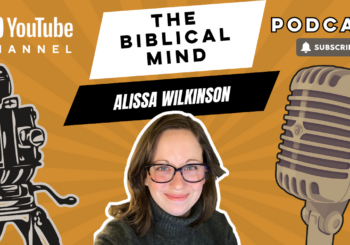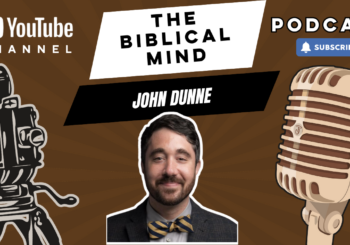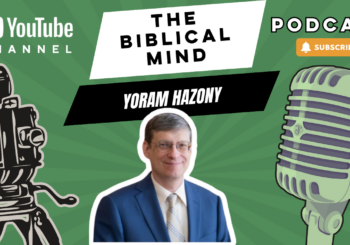Part of the False Dichotomies in the Church series
Old Covenant vs. New Covenant? A Better Way to Understand God’s Promises
‘I spy with my little eye something brown and curly,” my son said last week. I started by guessing the curly things. No luck. I guessed everything brown I could see, being pretty generous with the definition of brown. Van Gogh’s Postman’s beard? No. The stem of the ivy plant? No. After I conceded, my son informed me I was sitting on the brown curly thing in question: our couch. Never mind that our couch is more plum than brown—how is it possibly curly, I asked. “With my pocket microscope!” he said. Looking closer, I saw that he was right.
Enjoying this article? Read more from The Biblical Mind.
At the Lord’s table we hear: “This cup is the new covenant in my blood” (1 Cor 11:25). Hearing of the “new” covenant, it’s easy to imagine it as set against an “old” covenant. And if we have the letter of Hebrews in mind, it almost seems obvious that old and new covenants form a dichotomy: “In speaking of a new covenant, he makes the first one obsolete” (8:13). But to set old and new at odds with one another is a false dichotomy. We need to look closer.
When we see the rich variety of biblical covenants, we find that “old” and “new” is reductive. The covenants are plentiful, and the “new” covenant is woven of the same fabric as the old. But just as we won’t set old against new, we also can’t set Hebrews’ concentration on old and new against the rest of the scriptural witness. God’s Word doesn’t work against itself. The narrow focus of Hebrews has a lot to teach us about the way that Jesus fulfills and maintains all the biblical covenants. Scripture teaches us as we lean into tensions like these, pressing both sides together until they combust into a bright new understanding of God’s Word, of the way Jesus holds together all of these covenants.
All of this matters theologically in that God is not against himself, speaking in contradictory ways (though we will explore the tension). It also matters to each of us very personally in that our hope, especially in times of social instability and perhaps despair, is in the faithfulness of God to his people—which we see in his covenantal faithfulness.
The Two Sides: Expanding Old and New
The first thing to know is that there’s no covenant in Scripture that’s easily identifiable as the “old” covenant. There are several related covenants in the Old Testament, where we read about covenants with Abraham, Moses and Israel, and David, and a new covenant to be made with Israel. God’s covenant with Abraham promised him a family of blessing to all the earth, so that, as numerous as the stars are, “so shall your offspring be” (Gen 15:5).
God made a covenant with Moses and Israel at the foot of Mt. Sinai, and after reading the Book of the Covenant “in the hearing of the people,” they all said, “All that the LORD has spoken we will do, and we will be obedient” (Exod 24:8). The Mosaic covenant gives the shape of life with God.
Then there’s the Davidic covenant (2 Sam 7:16): “And your house and your kingdom shall be made sure forever before me. Your throne shall be established forever.” This is usually considered an unconditional promise covenant, and that’s right, but it’s also qualified in 1 Kings, where we read: “If your heirs . . . walk before me in faithfulness . . . there shall not fail you a successor on the throne of Israel” (1 Kgs 2:4; 8:25). None of these can easily be identified as the “old” covenant—and all give blessing in their own way to God’s people and the world.
Jeremiah’s announcement of the new covenant is well known (31:31–36): “Behold the days are coming, declares the LORD, when I will make a new covenant with the house of Israel and the house of Judah, not like the covenant that I made with their fathers on the day when I took them by the hand to bring them out of the land of Egypt . . . I will put my law within them, and I will write it on their hearts.” Glancing at this, we might think that we’ve found the “old” covenant, because Jeremiah says the new is going to be different from the Mosaic covenant. But then we see what the difference actually is: not a different law, but the location of the law, now written in hearts and not on stone. So just as it looks like the “old” covenant will be replaced, we look closer and see it pressed deeper into the hearts of God’s people.
Concentrating Old and New
Hebrews
Though the book of Hebrews speaks of a “new” and “better” covenant, the book isn’t wiping out any of Old Testament covenants so much as focusing on the covenantal work of Jesus. We read that Christ mediates a “better covenant” (8:6), and that Jeremiah, “in speaking of a new covenant, he makes the first one obsolete. And what is becoming obsolete and growing old is ready to vanish away” (8:13). The focus of Hebrews helps us understand the work of Jesus, especially the way his sacrificial death completes the sacrificial system given in the Mosaic covenant. But the Mosaic covenant—with the Ten Commandments, and others like “love your neighbour as yourself” (Lev. 19)—cannot as a whole be equated with the “old” covenant “becoming obsolete.”
The “old covenant” in Hebrews does refer to the Mosaic covenant, but only in part. Hebrews’ focus is limited to the sacrificial system, specifically animal sacrifice and the role of the high priest. Our eyes become fixed on the role of Jesus as “interceding high priest and sacrifice” in heaven. Hebrews explains the meaning and fulfillment of Israel’s sacrificial system through the ascension of the resurrected Jesus. Crucially, this does not mean that the practices are no longer significant. Just the opposite. For the point of the author is to see Jesus as the “perpetually present sacrifice,” to use a phrase from NT scholar David Moffitt. Jesus is the joint offering and high priest ever before God.1David Moffitt talks about the ascension of Jesus and Hebrews in lots of articles, a couple of books, and this Christianity Today blog post. So, it is only from an earthly vantage point that the temple sacrifices have become “obsolete”—as in no longer practiced on earth, for Jesus makes them perpetually and perfectly effective for the covenant people.
The Last Supper
The Last Supper accounts help us see more clearly why we shouldn’t view the new and old as enemies. In Mark and Matthew, Jesus announces that the cup is the “blood of the covenant” (Mark 14:24; Matt 26:28), while in Luke and Pauline texts we read of the “the new covenant in my blood” (Luke 22:20, 1 Cor 11:25; cf. 2 Cor 3:6). Examining this distinction, we see how old and new are held together in Jesus. Luke and Paul take up the prophetic announcement of Jeremiah 31, viewing Jesus’ sacrificial death as the fulfillment of the “new covenant.”
Mark and Matthew speak more simply of the blood of the covenant and emphasize that the blood is “for many,” creating a parallel between the institution of the Lord’s Supper and the Sinai covenant, in which Moses sprinkled sacrificial blood on the people (Exod 24).2Joseph Ratzinger (now Pope Emeritus Benedict XVI) discusses the Last Supper accounts in more detail in his essay, “The New Covenant: On the Theology of the Covenant in the New Testament.” The Sinai covenant is thus reconstituted, renewed, and extended through the blood of Jesus, whose sacrificial blood seals the bond between God and his covenant people, now including the nations (as promised to Abraham). In the Last Supper accounts, we find that the New Testament holds together the Mosaic covenant and the new covenant in the sacrifice of Jesus.
Jesus, Keeper of Covenants
The scriptural covenants are related through Jesus and need to be understood in the light of his works. In fact, these covenants are his works. He is the Word of God, the Torah of God, and all things that have their being do so because he has created them. “And he is before all things, and in him all things hold together” (Col 1:17). The covenants, too, do not pass away, but are held together and maintained by Jesus—even when we do our best (or worst) to “break” them. God’s covenants aren’t like your cellphone contract, terminated when one party doesn’t fulfill its obligation. God’s covenants break like hearts break: a relational wound. The prophecies of Jeremiah bear witness to God’s broken heart for his wayward people. And it’s in Jeremiah where the covenant is not revoked but pressed deeper into the hearts of God’s people.3Gerald McDermott talks about this in Israel Matters: Why Christians Must Think Differently about the People and the Land (Grand Rapids: Brazos Press, 2017), esp. 96–97. This happens precisely through the covenantal blood of Jesus. The covenants don’t end: Jesus is the keeper of the covenants, and he is “the same, yesterday, today and forever” (Heb 13:8). Jesus fulfills the covenants on our behalf by his own obedience on earth, and now ever before the Father as the slain lamb whose blood washes us whiter than snow.
God’s Faithfulness in Jesus
When King David was promised, “Your throne shall be established forever,” it took two generations until the kingdom was divided, and two centuries until there was no throne at all. It would have been easy for the ancient Israelites to fixate on the conditional aspect of God’s covenant with David: “If your heirs . . . walk before me in faithfulness . . . there shall not fail you a successor on the throne of Israel” (1 Kgs 2:4; 8:25). It would have been easy to think the covenant was over. But then God himself acted through Jesus on behalf of his people, established his throne, and fulfilled his promises.
Many of us now may feel isolated, lonely, or even abandoned, perhaps worried about the next generation or the future of the Church. It’s too easy right now to despair and cry, “How long, O Lord?” But because God acted for Abraham and his offspring, for Moses and the Israelites, and for David, all through Jesus for the good of his people, we can trust in his faithfulness now. The signs of God’s faithfulness are not hard to see. They are before us every week as we participate in the blood of the new covenant—in which all God’s covenants are “yes and amen”—at the Lord’s table.
End Notes
1. David Moffitt talks about the ascension of Jesus and Hebrews in lots of articles, a couple of books, and this Christianity Today blog post.
2. Joseph Ratzinger (now Pope Emeritus Benedict XVI) discusses the Last Supper accounts in more detail in his essay, “The New Covenant: On the Theology of the Covenant in the New Testament.”
3. Gerald McDermott talks about this in Israel Matters: Why Christians Must Think Differently about the People and the Land (Grand Rapids: Brazos Press, 2017), esp. 96–97.
Subscribe now to receive periodic updates from the CHT.





